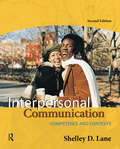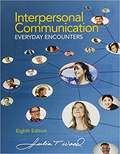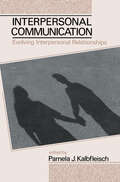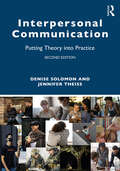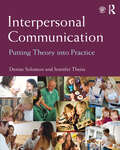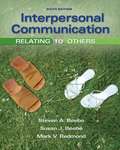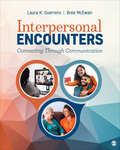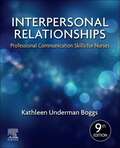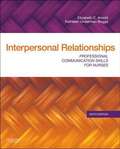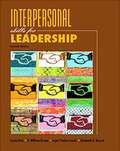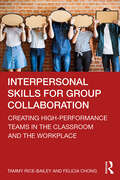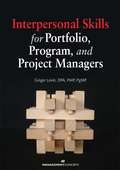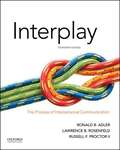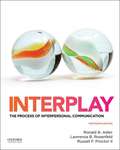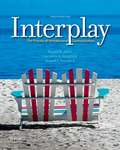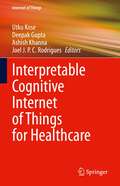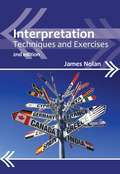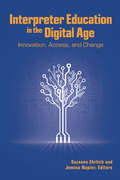- Table View
- List View
Interpersonal Communication: Competence and Contexts (Mycommunicationlab Ser.)
by Shelley D. LaneInterpersonal Communication: Competence and Contexts prepares students to communicate successfully in today's fast-paced and complex society through the implementation of a unique competence-building model. This highly readable text provides the theories, concepts, and applications in a pedagogically sound format based on a model of communication competence made up of three elements: motivation, knowledge, and skill. Studying interpersonal communication through this distinct framework will provide a foundation for students' motivation to communicate competently, increase their knowledge about communication, and enhance their acquisition and performance of communication skills. Covering a broad range of interpersonal communication themes, including strategic alternatives and solutions to communication challenges and information about friendship, family, romantic, and workplace relationships, this Second Edition presents theories, concepts, and activities with engaging examples and an attention-getting design.
Interpersonal Communication: Everyday Encounters (8th Edition)
by Julia T. WoodWritten by leading scholar and award-winning teacher Julia T. Wood, Interpersonal Communication: Everyday Encounters, 8e relates theory and skills directly to students' everyday interactions as it delivers a solid introduction to interpersonal communication. Completely up to date, the new Eighth Edition integrates the latest communication research, including findings from more than 125 new sources. Reflecting the author's expertise in gender and social diversity, the text includes an unparalleled focus on diversity. The new edition also features increased coverage of social media and an expanded emphasis on ethical choices. It addresses such timely issues as emotional intelligence and forgiveness, interracial relationships, safe sex, ways to deal with abuse from intimates, race-related differences between conflict styles, and the power of language.
Interpersonal Communication: Evolving Interpersonal Relationships (Routledge Communication Series)
by Pamela J. KalbfleischInterpersonal relationships are the core of our societal system and have been since before the dawn of civilization. In today's world, friends, lovers, companions, and confidants make valuable contributions to our everyday lives. These are the relationships whose members are not automatically participants as a result of their birth and kin affiliations. The focus is on these relationships that must be forged from the sometimes indifferent, and sometimes hostile world. Yet, there is still much that is not known about how these relationships evolve, how partners communicate in on-going relationships, how people keep their relationships together, and how they cope when they fall apart. Primary to the focus of this book is the underlying theme of evolving interpersonal relationships from the initial encounter to the mature alliance. The contributors to this volume provide a contemporary perspective for the study of interpersonal relationships. Fresh areas of scholarly inquiry are presented and existing approaches are re-examined. Research in the introductory chapters breaks new ground, and appraises the ultimate question of what impact initial interactions have on further relational development. The mid-section of the volume concerns communication issues that confront the members of a relationship in process, focusing on how conflict and jealousy are communicated to a relational partner. This research considers relational development as well as obstacles and barriers to evolving relationships. The concluding chapters probe the question: Ultimately do all good things have to come to an end? Employing innovative techniques to examine maturing and disengaging relationships, the research presented here focuses on how interpersonal relationships become committed and mature.
Interpersonal Communication: Putting Theory into Practice
by Denise Solomon Jennifer TheissThis fully revised text demystifies interpersonal communication skills by bringing the latest research together with practical guidance that prepares students to discern key communication dynamics and communicate more effectively in all areas of their lives. The new edition draws on current theory and research to guide students through the foundations of the discipline, recent developments in scientific research, and tips for improving their own interpersonal communication skills. In addition, readers will find: Expanded coverage of technology and computer-mediated communication, including explicit examples of what interpersonal communication looks like online. Invitations to engage with elaborated descriptions of theories and related resources on the companion website whenever prominent theories of interpersonal communication are mentioned in the text. A commitment to gender inclusive language and topics, as well as a new feature, "IDEA: Inclusion, Diversity, Equity, and Access," that invites students to consider ways to address exclusion and inequity in interpersonal communication. The fully revamped companion website includes updates across all resources, additional videos, self-quizzes for students, and all-new instructor resources, which can be accessed at www.routledge.com/cw/solomon. Also new to the companion website for this edition are links to essays and videos featuring the work that students in the Communication Studies program at the California State Prison, Los Angeles County, produced in response to self-reflection prompts in the first edition. These materials provide insight into facets of interpersonal communication in these students’ lives, and they offer a broad range of rich life experiences. Interpersonal Communication: Putting Theory Into Practice, Second Edition is ideal for undergraduate students in courses on interpersonal communication and communication skills.
Interpersonal Communication: Putting Theory into Practice (Icaz - Wiley Blackwell-ica International Encyclopedias Of Communication Ser.)
by Denise Solomon Jennifer TheissSome of us may believe that interpersonal communication is a matter of common sense or that skillful communication is an innate ability that you either have or you don't. In this text, Denise Solomon and Jennifer Theiss demonstrate that interpersonal communication skills are not just common sense; nor are they mysterious qualities that defy learning. Interpersonal Communication: Putting Theory into Practice draws on theory and research in the interpersonal communication discipline to help you identify strategies to improve your communication skills. Denise and Jen introduce interpersonal communication as a subject of scientific research that has enormous relevance to your daily lives. You will learn to use what researchers have discovered about interpersonal communication to improve your own ability to communicate well. You will also read about contemporary research in interpersonal communication, a foundation for establishing skill-building tips. In making research accessible, Denise and Jen show that communication scholars tackle important questions that have real-life relevance, and they dispel myths about interpersonal communication. A touchstone throughout this book is a commitment to topics and applications that can help you in many different situations and throughout your life. The companion website provides self-assessment quizzes, video interviews with scholars, and more. When you have finished reading this text, you will be better prepared to communicate effectively in all areas of your world, with skills and understanding that you can use to improve your interactions with the people around you.
Interpersonal Communication: Relating To Others
by Susan Beebe Steven Beebe Mark RedmondEmphasize the importance of relating to others <P><P> Interpersonal Communication: Relating to Others provides a clear overview of interpersonal communication theory and principles balanced with practical suggestions on how readers can apply these principles to become better communicators. Authors Steven Beebe, Susan Beebe, and Mark Redmond help readers see the importance of becoming other-oriented: a mindful process of considering the thoughts, needs, feelings, and values of others, rather than focusing exclusively on oneself. Thoroughly updated to reflect the latest developments in the field, the Eighth Edition explores the ever-increasing role of technology in interpersonal communication, including the latest research findings about how our electronic connections affect our face-to-face interactions.
Interpersonal Communication: Relating to Others
by Susan J. Beebe Steven A. Beebe Mark V. RedmondRecognized for its focus on being "other-oriented" - a focal point that highlights the importance interpersonal interactions -Interpersonal Communication: Relating to Others enhances communication competence in a variety of interpersonal relationships and interpersonal contexts. This sixth edition emphasizes the expanding role of technology in interpersonal communication and the implication of its use in our daily relationships and communication with others. Relating to Others also offers exceptional coverage of cultural diversity, to help readers understand and adapt to these differences while learning how to establish common links with other individuals enabling them to build and strengthen relationships in their everyday lives.
Interpersonal Conflict
by William W. Wilmot Joyce L. HockerInterpersonal Conflict explains the key dynamics of personal conflicts that we all face. Written for courses such as Communication and Conflict, Interpersonal Conflict, Conflict Management, Conflict and Negotiation, and Conflict in Personal Relationships, this textbook examines the central principles of effective conflict management in a wide variety of contexts--whether at home or on the job. Its combination of up-to-date research and examples gives students a theoretical and practical foundation in conflict management. Instructors and students can now access their course content through the Connect digital learning platform by purchasing either standalone Connect access or a bundle of print and Connect access. McGraw-Hill Connect® is a subscription-based learning service accessible online through your personal computer or tablet. Choose this option if your instructor will require Connect to be used in the course. Your subscription to Connect includes the following: * SmartBook® - an adaptive digital version of the course textbook that personalizes your reading experience based on how well you are learning the content. * Access to your instructor's homework assignments, quizzes, syllabus, notes, reminders, and other important files for the course. * Progress dashboards that quickly show how you are performing on your assignments and tips for improvement. * The option to purchase (for a small fee) a print version of the book. This binder-ready, loose-leaf version includes free shipping. Complete system requirements to use Connect can be found here: http://www. mheducation. com/highered/platforms/connect/training-support-students. html
Interpersonal Encounters: Connecting Through Communication
by Laura K. Guerrero Bree McEwanWith a practical and innovative approach, Interpersonal Encounters: Connecting through Communication shows students how interpersonal communication skills can be best used to accomplish everyday relationship goals. Guided by current interpersonal research from diverse authors and study participants, Laura K. Guerrero and Bree McEwan focus on the functions of interpersonal communication in our everyday lives and demonstrate how concepts, theories, and contemporary research apply to building, maintaining, and ending relationships. The book’s unique structure prepares students to become better communicators in their personal and professional lives. This title is accompanied by a complete teaching and learning package. Digital Option / Courseware SAGE Vantage is an intuitive digital platform that delivers this text’s content and course materials in a learning experience that offers auto-graded assignments and interactive multimedia tools, all carefully designed to ignite student engagement and drive critical thinking. Built with you and your students in mind, it offers simple course set-up and enables students to better prepare for class. Assignable Video with Assessment Assignable video (available with SAGE Vantage) is tied to learning objectives and curated exclusively for this text to bring concepts to life. LMS Cartridge: Import this title’s instructor resources into your school’s learning management system (LMS) and save time. Don’t use an LMS? You can still access all of the same online resources for this title via the password-protected Instructor Resource Site.
Interpersonal Encounters: Connecting Through Communication
by Laura K. Guerrero Bree McEwanWith a practical and innovative approach, Interpersonal Encounters: Connecting through Communication shows students how interpersonal communication skills can be best used to accomplish everyday relationship goals. Guided by current interpersonal research from diverse authors and study participants, Laura K. Guerrero and Bree McEwan focus on the functions of interpersonal communication in our everyday lives and demonstrate how concepts, theories, and contemporary research apply to building, maintaining, and ending relationships. The book’s unique structure prepares students to become better communicators in their personal and professional lives. This title is accompanied by a complete teaching and learning package. Digital Option / Courseware SAGE Vantage is an intuitive digital platform that delivers this text’s content and course materials in a learning experience that offers auto-graded assignments and interactive multimedia tools, all carefully designed to ignite student engagement and drive critical thinking. Built with you and your students in mind, it offers simple course set-up and enables students to better prepare for class. Assignable Video with Assessment Assignable video (available with SAGE Vantage) is tied to learning objectives and curated exclusively for this text to bring concepts to life. LMS Cartridge: Import this title’s instructor resources into your school’s learning management system (LMS) and save time. Don’t use an LMS? You can still access all of the same online resources for this title via the password-protected Instructor Resource Site.
Interpersonal Messages: Communication and Relationship Skills (2nd edition)
by Joseph A. DevitoUpdated in a new 2nd edition, Interpersonal Messages stresses the importance of politeness, cultural awareness and ethical principles within daily interpersonal interactions by engaging students with its lively and accessible insight to interpersonal skill development. By creating a foundation for the reader,Interpersonal Messages gives room to understand the concepts of interpersonal communication and to develop the skills necessary to apply what they've learned. With a focus on skill-building, this book helps the reader to understand how to master interpersonal communication and relationship skills.
Interpersonal Negotiations Breaking Down the Barriers
by Len LeritzFinally…a negotiation framework that encourages a positive outcome for both parties. This book takes the "win/win" concept a step further to make negotiating a more gratifying experience—even if you don’t get exactly what you want. Interpersonal Negotiations: Breaking Down the Barriers builds on mutual understanding and respect for each other's needs and provides a proven framework for fulfilling them. You’ll discover the secrets that can help turn an adversary into an advocate. You will learn how to: • Ensure a safe, fair, and effective negotiation process • Direct the negotiation process to create mutual understanding and acceptance • Recognize and understand your own needs and those of the other person • Make it easy for others to understand your needs • Be creative and persistent to address and resolve blocks to successful negotiation • Assess the other person's behavioral and emotional responses • Acknowledge your own and the other person's perceptions and beliefs • Avoid getting mired in the process
Interpersonal Relationships: Professional Communication Skills For Nurses
by Kathleen Underman BoggsMaster the skills you need to communicate effectively in the health care setting! Interpersonal Relationships: Professional Communication Skills for Nurses, 9th Edition shows how you can interact with patients, families, and the health care team in ways that are professional, honest, empathetic, and knowledgeable. A clear guide to essential competencies, this book covers relationship skills, health promotion, patients with special communication needs, and interprofessional communication. Case examples make it easier to apply communication theories to real-life practice. New to this edition are Next Generation NCLEX® (NGN)-style case studies and a new chapter on managing personal stress. Written by noted educator Kathleen Underman Boggs, this reference is a two-time winner of the American Journal of Nursing Book of the Year award.
Interpersonal Relationships: Professional Communication Skills for Nurses
by Rn Kathleen Underman Boggs Elizabeth C. Arnold Pmhcns-Bc Fnp-CsEffective communication with clients, families, and professional colleagues starts here! With Interpersonal Relationships: Professional Communication Skills for Nurses, 7th Edition, you'll see how good communication skills can lead to achieving treatment goals in health care. Clear guidelines show how you can enhance the nurse-client relationship through proven communication strategies as well as principles drawn from nursing, psychology, and related theoretical frameworks. And you'll see how to apply theory to real-life practice with case studies, interactive exercises, and evidence-based practice studies. A two-time winner of the AJN Book of the Year award, this book is updated to emphasize interdisciplinary communication and QSEN competencies. From expert nursing educators Elizabeth Arnold and Kathleen Underman Boggs, this comprehensive, market-leading text is unmatched for helping nurses develop effective communication skills! Interactive exercises offer the opportunity to practice, observe, and critically evaluate your professional communication skills in a safe learning environment. Practical guidelines describe how to modify communications strategies for various populations and situations including children, the elderly, end of life, clients with special needs, health teaching, stress, crisis, and professional colleagues. Case examples help you develop empathy for clients' perspectives and needs. Nursing, behavioral, developmental, family, and communication theories provide an essential foundation and a theoretical perspective for effective communication. Learning objectives, chapter overviews, and a detailed glossary focus your study and help you absorb and retain key content. NEW! A greater emphasis on communication, interdisciplinary theory, and interprofessionalism includes a focus on the nursing paradigm, nursing discipline, and ways of knowing. NEW! Focus on QSEN competencies reflects current thinking on technology, safety, and evidence-based practice, especially as they relate to communication in nursing. NEW! Discussion questions at the end of each chapter encourage critical thinking. NEW! Clarity and Safety in Communication chapter addresses topics such as huddles, rounds, handoffs, SBAR, and other forms of communication in health care.
Interpersonal Skills For Leadership
by William Brown Susan Fritz Joyce Lunde Elizabeth BansetFor courses in interpersonal skills, communication, leadership development, or service learning in Business Studies departments. This practical resource provides an introduction to interpersonal skills theories which are reinforced through experiential activities. Coverage focuses on the development of the basic interpersonal skills necessary to command one's own life, relate well to other people and to lead others in positive directions.
Interpersonal Skills for Group Collaboration: Creating High-Performance Teams in the Classroom and the Workplace
by Tammy Rice-Bailey Felicia ChongThis lively and engaging text introduces readers to the core interpersonal and organizational skills needed to effectively collaborate on group projects in the classroom and the workplace. Group projects are critical in preparing students for the realities of today’s workplace, but many college students despise group work—often because they have not been prepared with the necessary skills to effectively collaborate. This guide teaches core collaboration skills such as active listening, interviewing, empathy, and conflict resolution. It examines the research and theory behind these skills, and provides tangible ways to practice these skills both alone and in groups. This guide can be used a supplementary text for any courses involving group projects, and will also be of interest to professionals in communication, business, and many other fields.
Interpersonal Skills for Portfolio, Program, and Project Managers
by Ginger Levin DPA, PMP, PgMPImprove Your Interpersonal Skills to Achieve Greater Management Success!Any formula for management success must include a high level of interpersonal skills. The growing complexity of organizational portfolios, programs, and projects, as well as the increasing number and geographic dispersion of stakeholders and employees, makes a manager's interpersonal skills critical. The frequency and variety of interpersonal interactions and the pressure to perform multiple leadership roles successfully while ensuring customer satisfaction have never been greater.Interpersonal Skills for Portfolio, Program, and Project Managers offers practical and proven tools and methods you can use to develop your interpersonal skills and meet the challenges of today's competitive professional environment.Develop the interpersonal skills you need to:• Build effective, high-performing teams• Work efficiently with virtual teams• Develop approaches to build and maintain relationships with stakeholders at all levels• Handle stress and deal with unexpected critical incidents• Motivate your teamWhatever your level of experience, you will find these practical and proven methods to be the best formula for improving your interpersonal skills-and enhancing your management success.The chapters include discussion questions, making this a perfect text for use in academic or workshop settings.
Interplay: The Process Of Interpersonal Communication
by Ronald B. Adler Lawrence B. Rosenfeld Russell F. Proctor IIPacked with contemporary examples, cutting-edge research, and accessible writing, Interplay helps students apply insights from scholarship to everyday life. While highlighting the breadth of interpersonal communication research and theory, Interplay also gives students the practical skills they need to improve their own relationships. This new edition of Interplay is the most contemporary text available. The first chapter highlights masspersonal and multimodal communication, setting the stage for integration of social media and mediated communication throughout the book. Expanded discussions of intersectionality, code-switching, disability studies, and gender and language emphasize the role of culture and identity in shaping interactions. Every chapter is full of updated features, including"Focus on Research" and "Dark Side of Communication" boxes. Students can explore and apply concepts with the viral videos and discussion questions in the new "Watch and Discuss" activities that appear in every chapter. Oxford's easy-to-use Dashboard Online Assessment system now features an integrated eBook, video clips, and interactive assignments-everything you and your students need, all in one place.
Interplay: The Process of Interpersonal Communication
by Ronald B. Adler Lawrence B. Rosenfeld Russell F. Proctor IIWith its unique blend of compelling topics and rich pedagogy, Interplay: The Process of Interpersonal Communication, Fifteenth Edition, offers a perfect balance of research and application to help students understand and improve their own relationships. No other book prepares students better to start improving their relationships beginning with the first day of class.
Interplay: The Process of Interpersonal Communication
by Ronald Adler Lawrence Rosenfeld Russell ProctorWith its unique blend of compelling topics and rich pedagogy, the thirteenth edition of Interplay: The Process of Interpersonal Communication offers a perfect balance of theory and application to help students understand and improve their own relationships. Interplay's inviting visual format and rich pedagogy continue to make this text the market leader in Interpersonal Communication.
Interplay: The Process of Interpersonal Communication (12th Edition)
by Ronald B. Adler Russell F. Proctor Lawrence B. RosenfeldWith its unique blend of compelling topics and rich pedagogy, the twelfth edition of Interplay shows how scholarship, research, and theory can introduce students to communication and help them understand their own relationships in everyday life. New to this edition:The most extensive use of current research of any interpersonal book on the market: 1,512 total sources, of which 514 are new (34% more than the previous edition)Chapter 2, "Interpersonal Communication in a Changing World: Culture and Social Networking," includes the latest coverage of social media's impact on interpersonal relationships. Chapter 12, "Interpersonal Contexts" includes a new discussion of communication in friendships and updated sections on communication in intimate relationships and family"At Work" boxes in every chapter help readers apply scholarship to their careers"Media Clips" now use both television and films to illustrate communication concepts.
Interpretable Cognitive Internet of Things for Healthcare (Internet of Things)
by Deepak Gupta Ashish Khanna Utku Kose Joel J. P. C. RodriguesThis book presents research on how interpretable cognitive IoT can work to help with the massive amount of data in the healthcare industry. The authors give importance to IoT systems with intense machine learning features; this ensures the scope corresponds to use of cognitive IoT for understanding, reasoning, and learning from medical data. The authors discuss the interpretability of an intelligent system and its trustworthiness as a smart tool in the context of massive healthcare applications. As a whole, book combines three important topics: massive data, cognitive IoT, and interpretability. Topics include health data analytics for cognitive IoT, usability evaluation of cognitive IoT for healthcare, interpretable cognitive IoT for health robotics, and wearables in the context of IoT for healthcare. The book acts as a useful reference work for a wide audience including academicians, scientists, students, and professionals.
Interpretation
by James NolanIn recent decades the explosive growth of globalization and regional integration has fuelled parallel growth in multilingual conferences. Although conference interpreting has come of age as a profession, interpreter training programs have had varied success, pointing to the need for an instructional manual which covers the subject comprehensively. This book seeks to fill that need by providing a structured syllabus and an overview of interpretation accompanied by exercises in various aspects of the art. It is meant to serve as a practical guide for interpreters and as a complement to interpreter training programs in the classroom and online, particularly those for students preparing for conference interpreting in international governmental and business settings. This expanded second edition includes additional exercises and provides direct links to a variety of web-based resources and practice speeches, also including additional language combinations.
Interpretation: Making A Difference On Purpose
by Sam H. HamIn the new edition of the international bestseller Environmental Interpretation, Sam H. Ham captures what has changed in our understanding of interpretation during the past two decades. Ham draws on recent advances in communication research to unveil a fresh and invigorating perspective that will lead interpreters to new and insightful pathways for making a difference on purpose through their work.
Interpreter Education in the Digital Age: Innovation, Access, and Change
by Jemina Napier Suzanne EhrlichThis collection brings together innovative research and approaches for blended learning using digital technology in interpreter education for signed and spoken languages. Volume editors Suzanne Ehrlich and Jemina Napier call upon the expertise of 21 experts, including themselves, to report on the current technology used to provide digital enhancements to interpreter education in Australia, New Zealand, Brazil, Belgium, the United Kingdom, and the United States. Divided into three parts, Innovation, Change, and Community Engagement, this study focuses on the technology itself, rather than how technology enhances curriculum, delivery, or resources. Initiatives described in this collection range from the implementation of on-demand interpreting using iPad technology to create personalized, small-group, multidimensional models suited to digital media for 160 languages; introducing students to interpreting in a 3D world through an IVY virtual environment; applying gaming principles to interpreter education; assessing the amenability of the digital pen in the hybrid mode of interpreting; developing multimedia content for both open access and structured interpreter education environments; to preparing interpreting students for interactions in social media forums, and more. Interpreter Education in the Digital Age provides a context for the application of technologies in interpreter education from an international viewpoint across languages and modalities.
